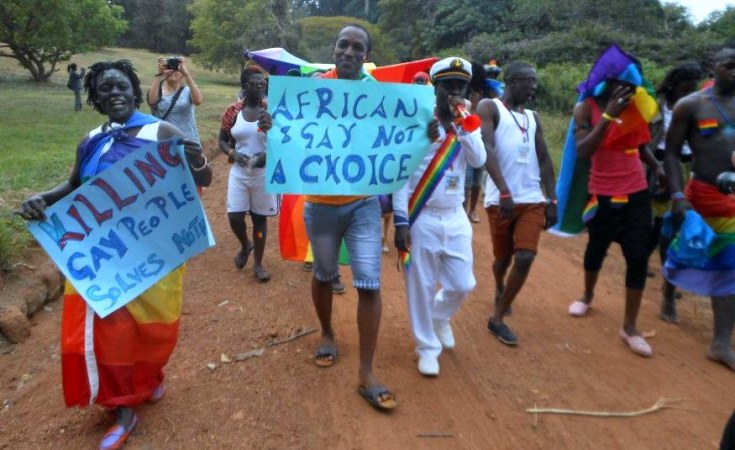Paris — Uganda's Constitutional Court annulled the discriminatory Anti-Homosexuality Act (AHA) passed by the Ugandan Parliament on 20 December 2013 and signed into law by President Museveni on 24 February 2014. The judges ruled on procedural grounds, finding that the text had been passed by Members of Parliament (MPs) without the requisite quorum. FIDH welcomes this decision upholding the rule of law, but underlines that LGBTI persons in Uganda remain stigmatized and repressed.
The Constitutional court's ruling annulling the anti-homosexuality law is celebrated as a historic victory led by Ugandan LGBTI activists and human rights defenders. On Friday 1 August, the law was declared « null and void » by a unanimous Court of five members ruling that the process had contravened the Constitution, as it was passed in Parliament without the necessary number of legislators - a third of the Assembly. This ruling comes after 10 petitioners, including academics, journalists, both ruling and opposition MPs, and human rights activists challenged the anti-homosexuality law in March 2014.
Though this ruling does not deal with the substance of the law, it still is a relief for LGBTI persons , civil society organisations and health service providers who were all put in situations of vulnerability and at risk of criminal prosecution », declared Karim Lahidji, FIDH President. « Ugandan authorities must now guarantee the effective protection of all persons against discrimination and violence, regardless of their sexual orientation, and investigate and prosecute human rights violations suffered by LGBTI persons since the passing of the law in Parliament last December », he added.
Despite the annulment of this punitive Anti-Homosexuality Act, the fight against discrimination and violence against LGBTI persons in Uganda is far from over : same-sex relations remain criminalised and punishable by imprisonment under existing legislation, and LGBTI activists are particularly at risk. Activists and civil society organisations warned that the state could appeal against the ruling in the Supreme court, and legislators might try to reintroduce anti-homosexuality measures. The Anti-Homosexuality Act has had dramatic consequences for LGBTI persons and led to their further stigmatization : since December 2013, the number of arrests, threats, harassments and assaults on people known or suspected to be LGBTI has increased drastically according to Ugandan rights groups. Following the promulgation of the law, some LGBTI Ugandans fled the country after being persecuted.
In line with its previous statements on the AHA, FIDH calls on the Ugandan authorities to engage in a genuine fight against discrimination by not attempting to re-introduce this law and ensuring respect for fundamental rights and freedoms of all persons regardless of their sexual orientation, in accordance with international standards.
The cancellation of this dangerous Anti-Homosexuality Act is an opportunity for Uganda to uphold its national and international human rights obligations by reviewing existing legislation criminalising same-sex relations. The rule of law should not go against the protection of people's fundamental rights and freedoms. Authorities have the duty to ensure the human security of every person in Uganda without any form of discrimination, including sexual orientation,», said Sheila Muwanga Nabachwa, FIDH Vice-President.
SOURCE Fédération internationale des ligues des droits de l'Homme (FIDH)


